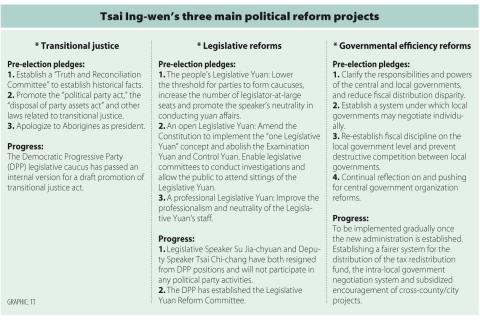The public is closely watching how President Tsai Ing-wen’s (蔡英文) administration delivers on her promises of political reform — namely the implementation of the transitional justice concept, reforms to the Legislative Yuan and increasing government efficiency.
The administration should aim for high standards when pushing the reforms, as it would speed up Taiwan’s democratization. These include ensuring greater transparency and open supervision of the Legislative Yuan via legal amendments, as well as promoting reforms that would require amending the Constitution.
Those amendments are aimed at establishing the kind of system the central government will adopt and eliminate long-standing problems by clarifying the separation of powers between the executive and legislative branches and abolishing the Examination and Control yuans.

However, for the government to truly become more efficient, it must start with the most vital element — the civil servants themselves. Whether the administration is able to establish a system to rank civil servants and ensure such jobs are no longer seen as a guarantee of an “iron rice bowl” will be key.
As for the implementation of the concept of transitional justice, it is a race against time and the Tsai administration must act fast to avoid a situation where calls to implement transitional justice seem to be more a slogan than an actual accomplishment.
Many of the files of the Chinese Nationalist Party (KMT) regime during the White Terror era have either been lost or were shredded, increasing the difficulty of determining the truth and reconstructing history.
The White Terror era refers to the repression that began after the 228 Incident in 1947, when an anti-government uprising was violently suppressed by the then-KMT government. The government later declared martial law. Historians estimate that between 10,000 and 30,000 people were killed.
Implementation of transitional justice also pertains to the KMT’s assets. Critics have labeled the KMT’s assets as “ill-gotten” because the party took many of them from the Japanese colonial government, private businesses and individuals when it took control of Taiwan in the late 1940s.
However, the KMT disputes the “ill-gotten assets” description, saying that all of its assets were acquired legally. Resolving the issue has been made more difficult by the KMT’s reported acceleration of its efforts to liquidate these assets.
Sources have said that Tsai would personally oversee the implementation by setting up a “Truth and Reconciliation Committee” in the Presidential Office to act in an advisory capacity, while the “Promotion of Transitional Justice Committee” at the Executive Yuan would be the group that implements the reforms.
The administration faces major difficulties in undertaking its proposed reforms, but these will be the best test of Tsai’s determination to push through reforms.
Translated by Jake Chung

Chinese spouse and influencer Guan Guan’s (關關) residency permit has been revoked for repeatedly posting pro-China videos that threaten national security, the National Immigration Agency confirmed today. Guan Guan has said many controversial statements in her videos posted to Douyin (抖音), including “the red flag will soon be painted all over Taiwan” and “Taiwan is an inseparable part of China,” and expressing hope for expedited reunification. The agency last year received multiple reports alleging that Guan Guan had advocated for armed reunification. After verifying the reports, the agency last month issued a notice requiring her to appear and explain her actions. Guan

GIVE AND TAKE: Blood demand continues to rise each year, while fewer young donors are available due to the nation’s falling birthrate, a doctor said Blood donors can redeem points earned from donations to obtain limited edition Formosan black bear travel mugs, the Kaohsiung Blood Center said yesterday, as it announced a goal of stocking 20,000 units of blood prior to the Lunar New Year. The last month of the lunar year is National Blood Donation Month, when local centers seek to stockpile blood for use during the Lunar New Year holiday. The blood demand in southern Taiwan — including Tainan and Kaohsiung, as well as Chiayi, Pingtung, Penghu and Taitung counties — is about 2,000 units per day, the center said. The donation campaign aims to boost

The Kaohsiung Tourism Bureau audited six hotels in an effort to prevent price gouging ahead of Korean band BTS’ concert tour in the city scheduled for Nov. 19, 21 and 22 this year. The bureau on Friday said that the audits — conducted in response to allegations of unfair pricing posted on social media — found no wrongdoing. These establishments included the local branches of Chateau de Chine, Hotel Nikko, My Humble House, and Grand Hai Lai, it said, adding that the Consumer Protection Commission would have penalized price gougers had the accusations been substantiated. The bureau said the Tourism Development Act

The Central Weather Administration (CWA) said a magnitude 4.9 earthquake that struck off the coast of eastern Taiwan yesterday was an independent event and part of a stress-adjustment process. The earthquake occurred at 4:47pm, with its epicenter at sea about 45.4km south of Yilan County Hall at a depth of 5.9km, the CWA said. The quake's intensity, which gauges the actual effects of a temblor, was highest in several townships in Yilan and neighboring Hualien County, where it measured 4 on Taiwan's seven-tier intensity scale, the CWA said. Lin Po-yu (林柏佑), a division chief at the CWA's Seismological Center, told a news conference